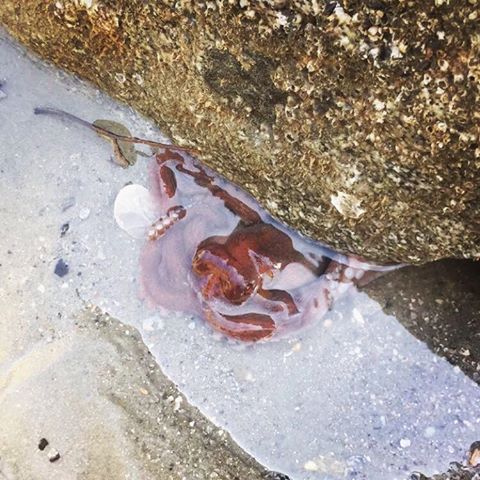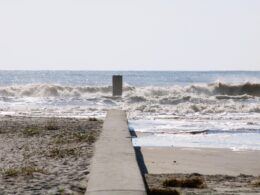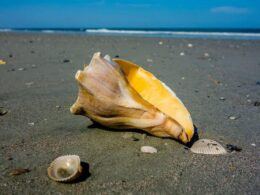Folly Beach is full of surprises. On any given day, you might spot surfers carving through the waves, dolphins chasing baitfish near the shore, or kids combing the sand for shark teeth. But if you’re very lucky, you might glimpse something far rarer — an octopus exploring the shallows.
Encounters like these remind us that Folly’s waters are teeming with marine life. While seeing an octopus isn’t common, it’s not impossible either. Every few years, residents or visitors share photos or stories of these intelligent, elusive creatures turning up in tide pools or near the jetties.
Whether you’re walking the sand flats at low tide or paddling around the Morris Island Lighthouse area, keep your eyes open — you may spot one of these fascinating eight-armed ocean wanderers.
Why Octopuses Visit Folly
The Atlantic waters off the coast of Folly Beach and Charleston are home to several species of octopus, most commonly the Common Octopus (Octopus vulgaris). These shy, nocturnal animals prefer rocky outcrops, oyster beds, and artificial reefs — all habitats found just off Folly’s coast.
Sometimes, during strong tides or seasonal shifts, they venture closer to shore in search of food or new shelter. You might even see one stranded briefly in a tide pool, especially after a full moon or a spring tide when water levels rise and fall dramatically.
If you ever spot one, consider it a special experience — and please give it space to safely return to the ocean.
Respecting Marine Life
Just like sea turtles and dolphins, octopuses play an important role in our coastal ecosystem. They’re both predator and prey, helping to maintain balance in the food chain.
If you’re lucky enough to encounter one near the surf:
- Watch, don’t touch. Octopuses are curious but delicate — and can be easily stressed or injured.
- Keep kids and pets back. A crowded tide pool can quickly become dangerous for a small animal trying to escape.
- Never try to keep one. All marine life is protected under state wildlife laws; octopuses belong in the wild.
You can also read more about protecting our beach ecosystem in our guide on environmental etiquette at Folly Beach.
7 Fascinating Facts About Octopuses
- They decorate their homes. Around their lairs, octopuses collect crab shells and other remains to build “middens” — a kind of underwater front yard that shows what they’ve been eating.
- They’re brilliant escape artists. Octopuses are among the smartest invertebrates on Earth, capable of solving puzzles, opening jars, and remembering routes.
- They have hidden tools. Inside their mouth is a hard beak and a barbed tongue called a radula, which helps them pry open and drill into shells.
- They’re venomous. Most species produce mild venom to immobilize prey — a surprising fact about such graceful animals.
- Their “head” isn’t their head. The large bulb on top is the mantle, which holds their organs. Their true head is the small area around their eyes.
- Their arms can think for themselves. Each sucker has up to 10,000 neurons, giving them remarkable touch sensitivity and even independent reflexes.
- They live fast, die young. Octopuses have short lives — most live only one to three years and die soon after mating. But in that short time, they leave an indelible mark on the sea.
When and Where to Spot One
Your best chance of seeing an octopus near Folly is during late summer or early fall, when water temperatures are warm and tide pools are active. Look near rocky areas or the edges of Folly Beach County Park after a low tide.
If you prefer to explore beneath the surface, snorkeling or diving trips near Charleston’s artificial reefs sometimes reveal these elusive creatures gliding gracefully through the current.
The Ocean Still Surprises Us
Whether you’re walking the pier at sunset, watching dolphins crest offshore, or — if fortune smiles — spotting an octopus in a Folly tide pool, the ocean here always finds a way to amaze.
So next time you visit, take a quiet moment by the water. Look closely. Folly’s tide pools hold stories few people ever get to see.













